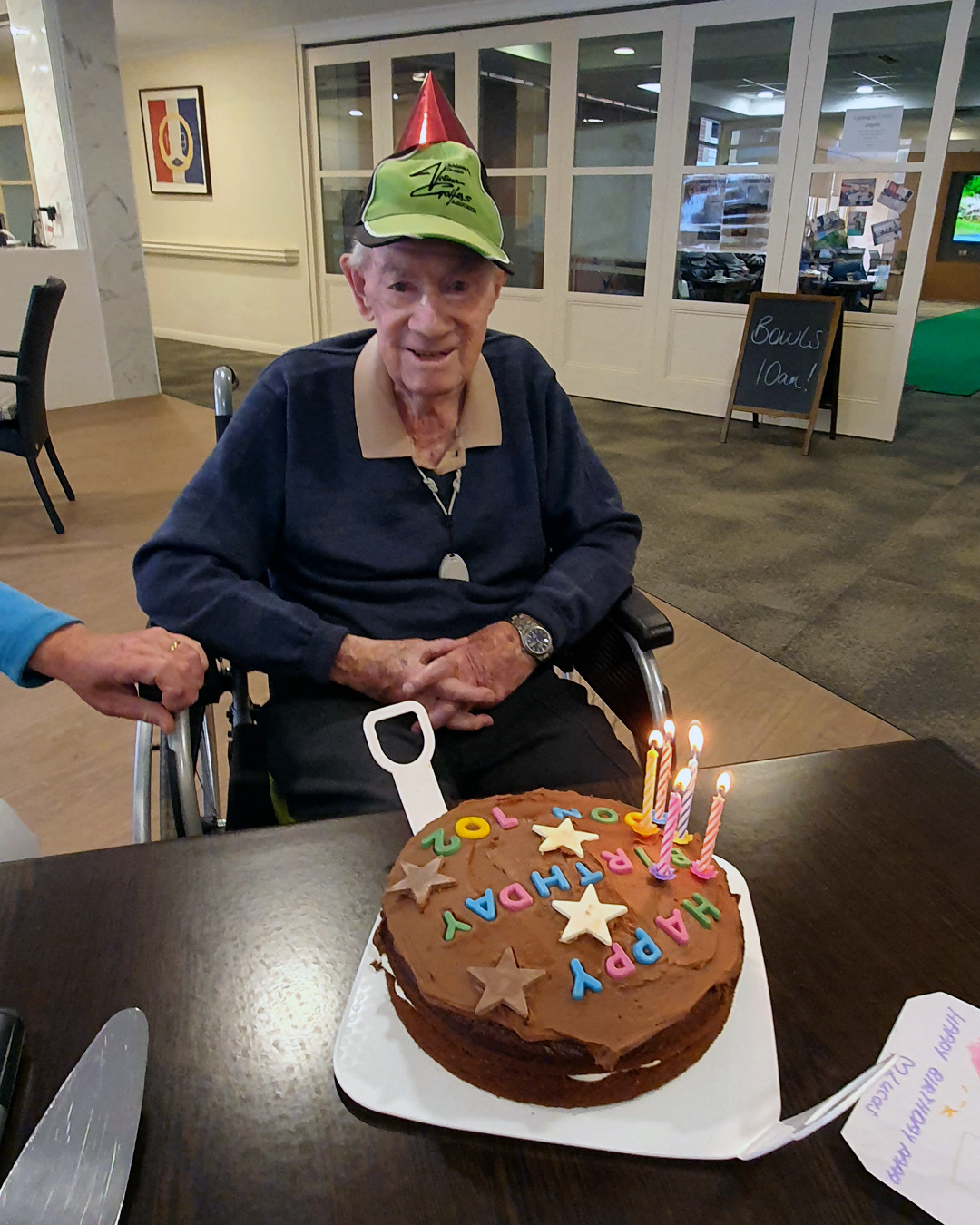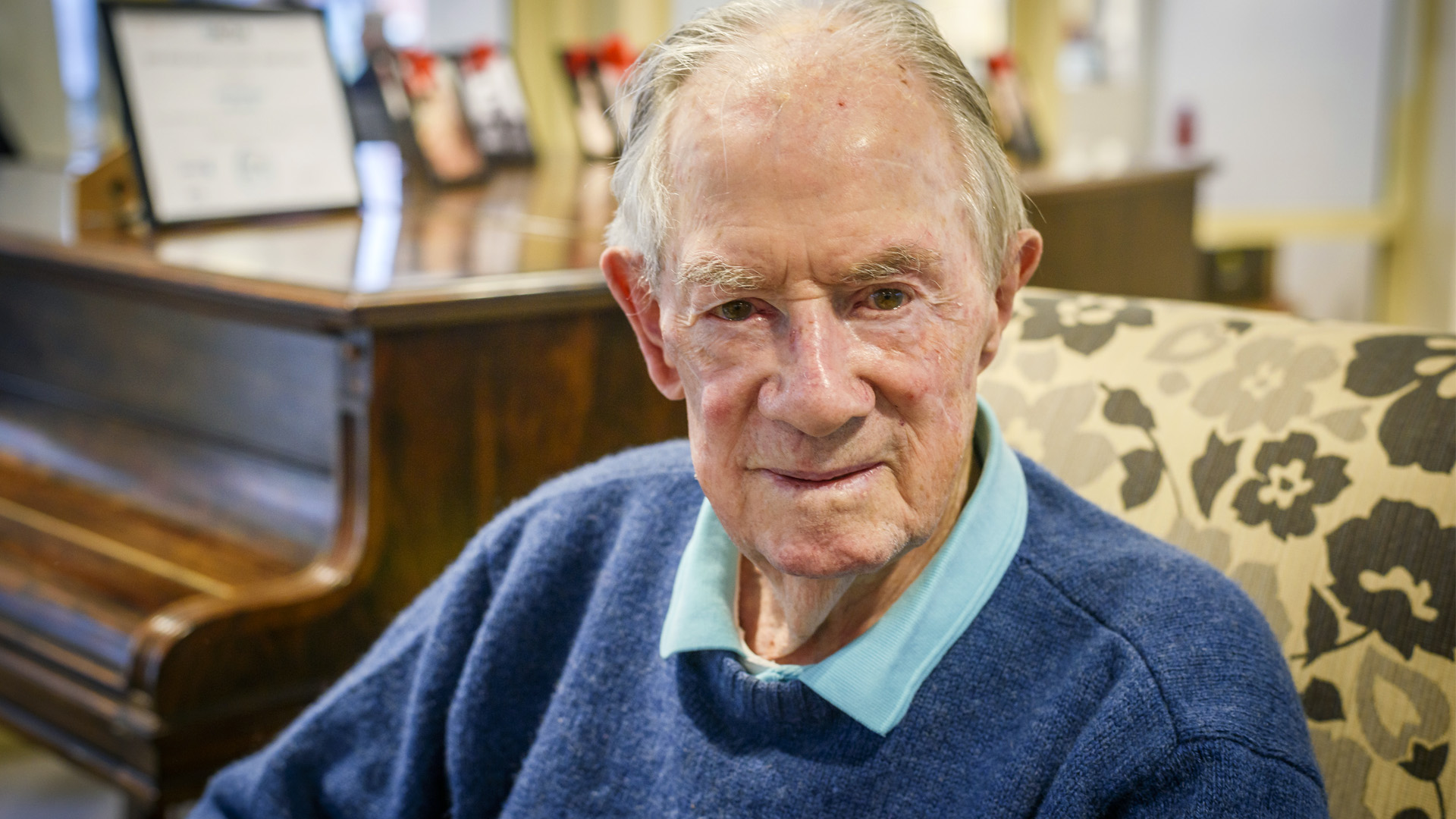Aug 2025
Remembering WWII: South Australian veteran’s service to country and community
In the lead up to this year’s 80th anniversary of Victory in the Pacific Day, Veterans SA interviewed World War II veteran Don Looker to share his story of service with the broader South Australian community.
At the time of the interview, conducted in June 2024, Don was 100 years old. On 29 July this year, Don – a grandfather of eight and great-grandfather of five – celebrated his 102nd birthday.
This is his story.
Born in Payneham, Adelaide, on 29 July 1923, Donald ‘Don’ Sydney Looker’s commitment to mateship was on display from an early age.
Enrolled at Payneham Primary School, he went for just one day. The next day, his aunt, who had taken him to school, was unwell, leaving Don to exercise his preference to join his friends in the classroom at Wellington Road Primary School instead.
Referred to as ‘Welly’ Road School, it is known today as Trinity Gardens School. Here, Don remained and completed primary school before finishing his education in the ‘intermediate’ years at Norwood High School.
Don says he had no desire to serve in World War II: “The War broke out and I thought ‘I don’t want to be in this’ because I had friends I associated with; their fathers had been to World War I.
“Two of them in particular had been badly gassed and one had been shell-shocked and I thought ‘well, I don’t want to be like that so I’m not going to enlist’.
A change of heart: Japan attacks Pearl Harbor
On 7 December 1941, Japan launched a surprise attack on the US naval base at Pearl Harbor, Hawaii.
Don, aged 18, had secured a job as an apprentice electrical fitter. On seeing his friends join the War effort: “I thought I’d better join up as my mates were doing so,” he says.
On 20 June 1942, he enlisted in the Royal Australian Air Force.
“I wanted to be a pilot of course, everyone wanted to be a pilot, we had all been watching Errol Flynn,” laughs Don.
“But I wasn’t chosen for that; because I was a trainee electrician, they thought I’d make a good wireless operator, so I went to Ballarat for six months for training as a wireless air gunner.”
In Ballarat, Victoria, Don underwent academic training in many subjects including trigonometry and was taught morse code.
Following another training stint, this time in Sale, Don says he was surprised to find himself being posted back to South Australia: “I thought I would go to England to work with the RAF – the Royal Air Force – but that didn’t happen; instead, I got sent to Mount Gambier.”
By this time, Don was a Sergeant. He spent approximately seven months in the South-East training navigators (observers) before finally leaving Australia for the UK where he was to face the grim realities of War for himself.
On the front line of World War II
In the UK and armed with modern aircraft and radios – which he describes as being ‘far superior’ to that used in Australia – Don quickly realised that he would need to redo his training.
“So we started again,” he laughs.
“Eventually, I finished up in a crew piloted by Australian, Jim Robson of Perth, and five Englishmen. We became a crew of seven and started flying together, seeing how we work together.”
The crew went on to fly on Stirling aircraft on exercises all over Britian and the English Channel before moving into a Lancaster bomber crew. They were posted to 115 Squadron and began operations over Germany.
“That was fair dinkum then,” says Don, recalling his first operation to Neuss, Germany.
“My first operation was with a Canadian crew who were doing their 30th, which was their last.
“The signals leaders called me in to say his signals operator was sick – would I take his place?
“My pilot was going with another crew for familiarisation to see what it was like on ops.
“I didn’t really want to go with this [Canadian] crew, but I thought that they would think I am a coward if I don’t. So, I volunteered to do my first operation with this crew … and found out what it was like to be shot at.”
Don completed 38 operations in Bomber Command – 23 days and 15 nights – between November 1944 and May 1945. In between, life carried on. Don wrote to his parents every week and had his 21st birthday in England, far from home.
“We just kept flying and we were very, very lucky. We managed to do 38 operations, each one when you come under heavy fire from anti-aircraft guns and on the lookout for fighter aircraft trying to shoot you down.
“We got a few holes in the aircraft on occasion from the anti-aircraft guns but I was lucky enough to survive.”
By the end of his service, Don had accumulated 760 hours of flying and was discharged as a Flying Officer in October 1945.
Back on home soil
Returning from war, Don pursued a relationship with Patricia who he had met in Mount Gambier prior to going to the UK.
Don says: “I kept writing to her through the war and when I got back home, she had found a job in Adelaide as a reporter at the Advertiser, or The Chronicle as it was called in those days.
“To cut it short, we got married and raised four kids.”
Tragically, Patricia died when the youngest of their four children was only one year old. He went on to marry Ethel who died in 1982 and then Margaret (Margie) who died in 2021.
Don and Patricia’s children – David, Tim, Anne, and James – are now in their 60s and 70s.
A lifetime of service – and sport
Over his lifetime, Don remained committed to mateship and stayed close to his RAAF roots, serving 12 years in the Citizen Military Forces before retiring in his last rank as Major.
An active participant in the Neighbourhood Watch program for 31 years, Don also served as a Justice of the Peace between 1981 and 2016. Among his many community service commitments, he was also an active Member of Payneham Probus, RSL, and the Airforce Association and ran the Veterans Golf Club for many years.
According to his son James, Don also had a love of sport: “He was an A-Grade cricketer for Kensington District Cricket Club in Adelaide and took the field with the likes of Bradman, Clarrie Grimmett, and Victor Richardson amongst other notables,” says James.
“He also had a distinguished Aussie rules football career at Payneham Football Club and captained the Australian Transport Workers 11 against New Zealand in a series.”
The December 2016 edition of RSL SA publication The Signal reported on an event at Adelaide Town Hall in September of the same year where Don was one of 10 ex-RAAF personnel to be awarded the Legion of Honour by then French ambassador to Australia, Christophe Lecourtier.
In 2021, Don was honoured with the Citizen of the Year award by the City of Norwood, Payneham and St Peters.
Veterans SA would like to thank Mr Looker for sharing the story of his life and service with the community of South Australia for the 80th anniversary of the end of World War II.
Veterans SA also acknowledges the assistance of RSL Care SA and the Looker family in helping to bring Don’s story to the public.




